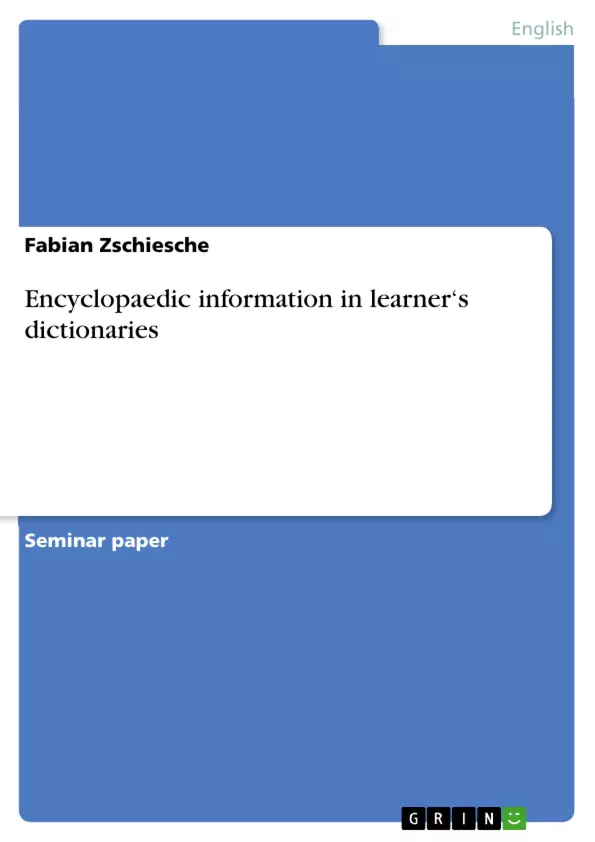Talking about encyclopaedic information in learner‘s dictionaries might lead to a never ending debate whether learner‘s dictionaries should include such additional information and at the same time to what extent. In fact Herbert Andreas Welker‘s survey of empirical studies concerning the dictionary use also helps to point out that there is little consent when it comes to this debate.
As a matter of fact it is quite difficult to distinguish where exactly an entry becomes encyclopaedic or not. Therefore another special form of learner‘s dictionaries also is important to be mentioned when talking about encyclopaedic information: the encyclopaedic learner‘s dictionaries. Since those kind of dictionaries are somewhere in between a encyclopaedia and a dictionary, Martin Stark also likes to call them „Lexicographical Hybrid“ (Stark 1999: 3). In order to analyse encyclopaedic entries in learners‘s dictionaries it therefore seems to be inevitably regarding those encyclopaedic learner‘s dictionaries as well. As a consequence this paper will briefly illustrate some general information of learner‘s dictionaries as such. As a next step a closer look will be taken at the distinctive features of the encyclopaedic entries within learner‘s dictionaries and at the encyclopaedic learner‘s dictionaries and their role in language teaching and learning.
Inhaltsverzeichnis (Table of Contents)
- Introduction
- General information on learner's dictionaries and encyclopaedicity
- The idea of the learner's dictionary
- The idea of the encyclopaedic learner's dictionary
- What makes encyclopaedic information encyclopaedic
- Encyclopaedic tradition in English dictionaries
- Encyclopaedic learner's dictionaries
- Examples of encyclopaedic learner's dictionaries
- The Longman Dictionary of English Language and Culture
- The Oxford Advanced Learner's Encyclopaedic Dictionary
- Different types of encyclopaedic entries
- Proper noun entries
- Large encyclopaedic articles and their value for the learner
- Comparing examples on the basis of those dictionaries
- Examples of encyclopaedic learner's dictionaries
- Conclusion
Zielsetzung und Themenschwerpunkte (Objectives and Key Themes)
This paper aims to explore the inclusion of encyclopaedic information in learner's dictionaries and examine the significance of encyclopaedic learner's dictionaries in language teaching and learning.
- The concept and development of learner's dictionaries and their encyclopaedic counterparts.
- The nature and characteristics of encyclopaedic information in dictionaries.
- The role of encyclopaedic entries in aiding learners' understanding of cultural nuances and contextual meaning.
- The debate surrounding the inclusion of encyclopaedic information in dictionaries, including arguments for and against.
- Examples of encyclopaedic learner's dictionaries and the types of encyclopaedic entries they provide.
Zusammenfassung der Kapitel (Chapter Summaries)
- Introduction: This chapter sets the stage for the discussion, highlighting the debate surrounding the inclusion of encyclopaedic information in learner's dictionaries and its implications for language learning. The chapter acknowledges the importance of considering both the learner's perspective and the historical development of encyclopaedic entries in dictionaries.
- General information on learner's dictionaries and learner's encyclopaedic dictionaries: This chapter delves into the fundamental concepts of learner's dictionaries, outlining their primary purpose and intentions. It differentiates between traditional learner's dictionaries and their encyclopaedic counterparts, emphasizing the unique features and benefits of the latter. The chapter explores the reasons behind the emergence of encyclopaedic learner's dictionaries, emphasizing the need to address the cultural and contextual aspects of language learning.
- The idea of the learner's dictionary: This chapter offers a closer look at the definition and purpose of learner's dictionaries, exploring the various perspectives on their role in language learning. It highlights the importance of choosing the right dictionary for specific learning needs and ensuring the quality and structure of the content.
- The idea of the encyclopaedic learner's dictionary: This chapter discusses the concept of encyclopaedic learner's dictionaries, exploring their unique features and their potential to bridge the gap between lexicographical and encyclopaedic information. It examines the rationale behind the inclusion of encyclopaedic information in dictionaries, emphasizing its role in providing learners with culturally relevant context and facilitating a deeper understanding of language usage.
- What makes encyclopaedic information encyclopaedic: This chapter delves into the definition and characteristics of encyclopaedic information, differentiating it from purely linguistic information presented in dictionaries. It explores the historical development of encyclopaedias and their evolution into reference works encompassing broader knowledge domains. The chapter analyzes the overlapping nature of encyclopaedic and linguistic information, highlighting the challenges of clearly distinguishing between them.
Schlüsselwörter (Keywords)
This preview focuses on key terms and concepts such as encyclopaedic information, learner's dictionaries, encyclopaedic learner's dictionaries, lexicographical hybrids, cultural content, language teaching and learning, dictionary use, encyclopaedic entries, and the role of dictionaries in providing contextual and cultural understanding.
Frequently Asked Questions
What is an "Encyclopaedic Learner’s Dictionary"?
It is a "lexicographical hybrid" that combines linguistic definitions with cultural and encyclopaedic information to help language learners understand the context of words.
Why is encyclopaedic information important for language learners?
It provides cultural nuances and background knowledge that are essential for understanding how a language is used in real-world contexts, beyond simple translations.
What are some examples of such dictionaries?
The paper analyzes "The Longman Dictionary of English Language and Culture" and "The Oxford Advanced Learner’s Encyclopaedic Dictionary."
What is the debate surrounding these dictionaries?
There is an ongoing discussion about to what extent a dictionary should include extra-linguistic information and whether it distracts from or supports the learning process.
What qualifies as "encyclopaedic information" in an entry?
Entries regarding proper nouns, historical events, cultural traditions, or large articles explaining social concepts are considered encyclopaedic.
- Quote paper
- Fabian Zschiesche (Author), 2011, Encyclopaedic information in learner‘s dictionaries, Munich, GRIN Verlag, https://www.grin.com/document/368119



